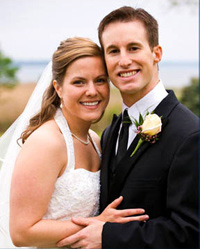Matters of the Heart: Diabetes and Relationships
 by kerri morrone
by kerri morrone
When it came to dating, I wanted potential love interests to know up front that I was diabetic. There are plenty of people out there who are accepting, supportive, and caring when it comes to diabetes. But there are the few who aren’t, and I wanted to know what kind of man I was dealing with as soon as possible.
My now-husband and I met through our old jobs. My pump was clipped to the waist of my pants, and he noticed it.
“Is that an insulin pump?”
“Yes. I have type 1 diabetes.”
“My friend’s ex-girlfriend wore one.” Pause. “So what time are you off work?”
And here we are, four years later, newlyweds.

Love me? Love my diabetes
It is important that diabetes be an accepted and understood aspect of my life. I need to be able to talk about the challenges and successes of managing this disease. Just as I need to know my partner’s goals and frustrations, he needs to know mine. With diabetes being a large part of my day-to-day life, my partner needs to know the intricacies of diabetes management as much as he would my favorite author or sweater.
Many parents of children with diabetes and people with diabetes themselves have asked me about how I handle this matter in my relationships. The truth is, I am not sure I see much of a distinction between my relationships with men and those with friends. I have been diabetic since grade school, so my disease is part of all of my relationships. I’ve never known a first date, an argument, or a sexual experience without diabetes in my sidecar. I view my relationships as just that, not as “a relationship that involves diabetes.” I view myself similarly – I’m Kerri, not “Kerri who has diabetes.” Granted, being with me may come with unusual circumstances, but whose relationship doesn’t include some idiosyncrasies?
I realize this may seem too simplistic. I also fully realize what challenges accompany a relationship that involves diabetes. Sleeping in bed with me means resting beside my insulin pump. Living with me means insulin bottles in the fridge and infusion sets in the bathroom cabinet. But it’s more than just the accoutrements. My life may eventually include diabetes-related complications. There will be days when I’m frustrated by disease management or feeling overwhelmed. It’s more than just a series of blood tests and counted carbohydrates. Diabetes is an emotional and physical journey that reaches far outside the doctor’s office. Loving me means being patient and understanding, loving and supportive. It means keeping the lines of communication open and asking questions about things you don’t understand.
But it also means realizing that this is good advice for any relationship, diabetes or not.
For me, diabetes isn’t this “separate thing” that I keep locked in a box and only grapple with in privacy. Diabetes is a constant part of my life, something that touches so much of my everyday activities. I test before meals, wear an insulin pump, and carry juice with me everywhere I go. Pretending it's not part of my partner’s life, too, is foolish. I prefer to have diabetes as an open part of our relationship. It’s my diabetes, but we work through it together.
Thankfully, diabetes has never caused someone to pass on my affections. It may be just luck, but I think it’s more the fact that I don’t leave room for that kind of rejection. Diabetes is not my defining quality, it’s not the topic of every conversation, and it doesn’t dictate which way my world is spinning. It’s simply a part of me. Love me? Love my diabetes.
My then-boyfriend learned about diabetes, and about me, as we dated. He asked me to marry him on a balcony in St. John in the Virgin Islands, wanting to make me, and everything that came with me, a part of his life forever. Last month we took our vows in front of our friends and family, promising to love and honor one another for the rest of our lives, in sickness and in health.
Before the wedding, we were at my aunt’s house, all of us girls. The members of my bridal party were already in their dresses, putting the finishing touches on their makeup in the full-length mirror. My mother was in the back bedroom with me, helping me into my wedding gown.
“You look beautiful.” She buttoned the back of my dress and adjusted my necklace.
“Thanks, Mom. I’m so nervous. And excited. I’m getting married, can you believe it?” I looked at myself in the mirror, following the beading of the bodice down to my hips, then along the seam of my gown where the pocket was hidden.
My mother helped me lift my dress and slide the insulin pump into a carefully crafted pocket on the inside of my petticoat. We connected the tubing to the infusion set on my thigh and snaked the remaining tubing through a hole in the petticoat. My mother let the fabric of the dress fall loosely and the pocket blended into the dress.
I looked in the mirror again. I couldn’t see the pocket, even though I was looking for it. I didn’t look like a person with diabetes – I simply looked like a bride. There was nothing to see but me.







